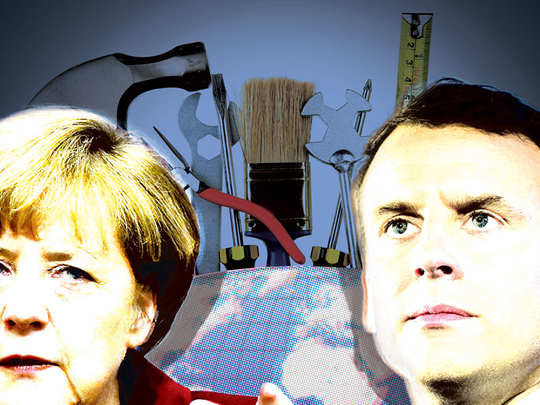
The world, for the first time since the last great war, is trying to adjust to the new reality that is emanating from the new United States administration, particularly Europe. The European Union (EU) on its part is facing a double challenge. On the one hand, the ramifications of the US eventual scheme, based on indications coming out of Washington DC, on Nato and cross the Atlantic relations, as that the new administration intends to gradually disengage and concentrate on home affairs. On the other hand, as Britain is about to begin Brexit negotiation with the EU, what sort of Europe we are going to end up with in two-year time.
Therefore, Europe has begun to resort to plans to enhance its power, politically, economically and militarily, and actively considering restructuring its own strategy based on protecting its own interests in this fast-changing world. For Germany, the largest economy in Europe, it feels it is urgently necessary to build up a European defence arm. It has already started this process, though it is in its infantry stages, with the Netherland, Romania and the Czech.
In an unprecedented move, these countries have recently declared the integration of their armed forces. This is only a first step towards what many believe the formation of the first ever European unified army in which Germany will be the leading force. Undoubtedly, such development, if allowed to progress, will provide Europe for the first time in its history, with its own army.
Europe feels the needs to rapidly change because of the problems, mostly of geo-political nature whether in North Africa, Ukraine or sub-Saharan Africa, it has been facing over the last few years. The most threatening problem that Europe is engulfed with, is the threat of terrorism, whether by Daesh (the self-proclaimed Islamic State of Iraq and the Levant) or other extremist groups, as it was seen in France, the Netherlands, Belgium, Britain and Germany. The consequences of the chaos in Syria and Iraq and the instability in Turkey are particularly alarming.
Though Germany is still at the beginning stages of enhancing its own military power, France is relatively well ahead as an international player. Its army is the largest among the European Union (EU) countries. Also, in addition to its role on the world stage as one of the five permanent members of the United Nations Security Council, France is a well-experienced power as a peace-keeper in many troubled spots in the Middle East and Africa.
After the stunning election of Emanuel Macron as President, France is expected under the present circumstances to lead Europe in the immediate future to play a larger role in world affairs. With his political party, La Republique en March (Republic on the Move) LREM, Macron brings with him immense fresh power into the world stage. The French president formed his party just over a year ago and half of its candidates that stood for the recent General Assembly elections, have little or no political experience. They included a retired bullfighter, a Rwandan refugee and a mathematician.
France’s entire political map has been transformed as traditionally dominant parties for almost a century have been deeply smashed. Macron’s LREM and supporters have incredibly claimed success, overwhelmingly defeating the centre-right Republicans, the far-right National Front of Marine Le Pen and the far-left La France Insoumise (France Unbowed). Even the Socialists of the late Francoise Mitterrand and former president Francoise Hollande came last on the electoral list.
The first challenge facing the new French president is within Europe. This probably would explain why he made his first official trip immediately after his election, to Germany. Now with Britain due to be soon out of the EU through Brexit, many are asking whether Macron can succeed in reforming the European bloc and the Eurozone area.
The European question and France’s membership in the EU were central to this year’s French presidential election campaign for at least two months. It is clearly obvious that the call for a ‘Frexit’ raised by Marine Le Pen during the campaign has cost her dearly in the second round. Le Pen miserably failed in winning the hearts and minds of the French people as the clear majority (over 60 per cent) voted to remain attached to European political and economic structure as well as the euro. Consequently, the extreme-right National Front representation in the General Assembly has been reduced in the parliamentary election to a mere seven seats.
However, Macron’s success in Europe depends entirely on the attitude of Germany, of its government as well as its public opinion, as Germany hugely outweighs France and the rest of Europe economically. Therefore, its support of Macron’s policy is vital to his success of France, Europe and beyond. This would explain the reason why Macron’s first trip after entering the Elysee Palace was made to Berlin. The crushing defeat of Le Pen in the second round was delightfully surprising for Germany who feared a tight outcome, if not her victory.
Now with the expected win of Merkel’s coalition in the German election in September, a Franco-German axis to lead Europe is vital to the success of any future European policy internally and overseas. The leading German weekly Der Spiegel believes such a coalition is essential for the survival of the EU, even though it is going to cost heavily to German economy. On its cover last May, the magazine came out with a sub-header that said: ‘Macron saves Europe ... and Germany foots the bill’. Nothing can summarise the expected European coalition better.
Mustapha Karkouti is a former president of the Foreign Press Association, London. You can follow him on Twitter at @mustaphatache.










